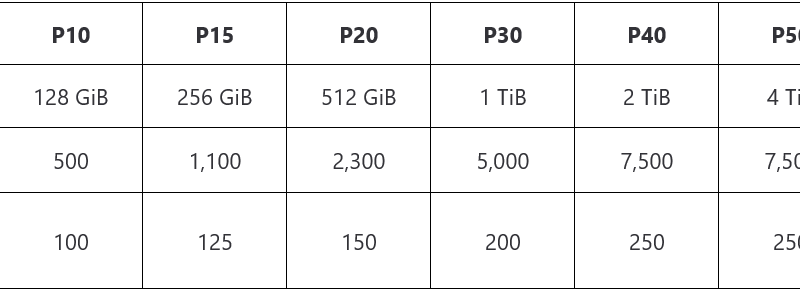Larger, more powerful Managed Disks for Azure Virtual Machines
Today, we are excited to announce the general availability of larger and more powerful Azure Managed Disk sizes of up to 32 TiB on Premium SSD, Standard SSD, and Standard HDD disk offerings. In addition, we support disk sizes up to 64 TiB on Ultra Disks in preview.
We are also increasing the performance scale targets for Premium SSD to 20,000 IOPS and 900 MB/sec. With the general availability (GA) of larger disk sizes, Azure now offers a broad range of disk sizes for your production workload needs, with unmatched scale and performance.
Some of the benefits of using larger disk sizes are:
- Grow your virtual machine (VM) disks’ capacity independently of the VM size you are using. You can attach more disk capacity per VM without having to upgrade to larger VM sizes or leveraging multiple VMs. For instance, you can now attach two 32 TiB data disks on the smallest B1 Azure VM to achieve total disks capacity of 64 TiB. Our largest VMs can now support up to 2 PiB of Disks Storage on a single VM. This provides a cost-effective solution to migrate data hosted on-premises disks, NAS, or backup data to Azure.
- Lift and shift a new range of workloads to Azure with the higher performance scale limits. With Premium SSDs offering up to 20,000 IOPS and 900 MB/sec, you can accelerate a wide variety of transactional workloads and exceed the on-premises runtime performance of data analytics applications. Moreover, the higher scalability limits on Standard SSDs make it the perfect fit for hosting big data workloads and scale-out file servers that are extremely throughput intensive.
- Simplify your deployments, service management, and reduce VM maintenance costs by avoiding the need to stripe multiple disks to achieve larger capacity or high performance. You can still stripe multiple large disks to achieve even higher capacity and performance.
For more information on the new disk SKUs and the scalability targets, please see the section below. To achieve the expected disk IOPS and bandwidth, we recommend that you review our guidance on how to optimize your disk performance.
Premium SSD disks
Premium SSDs are ideal for enterprise applications like Dynamics AX, Dynamics CRM, and database workloads like SQL Server, Cassandra, and MongoDB that require consistent high performance and low latency.
Standard SSD disks
Standard SSDs are suitable for web servers, low IOPS application servers, big data, and enterprise applications that need consistent performance at lower IOPS levels. 
Standard HDD disks
Standard HDDs based on magnetic drives offer the most cost-effective solution for Dev/Test and backup scenarios. 
Note:
- To achieve the target performance of Standard SSD and Standard HDD new disk SKUs, you should use these recommended VM series.
- P60/70/80 and E60/70/80 disks now have higher performance targets than scale limits offered in preview. If you deployed these disk SKUs in preview, you can follow the guidelines to make sure your existing disks are updated for the higher GA performance.
Getting started
You can create new Managed Disks or extend your existing disks to larger sizes using the Azure portal, Powershell, or CLI today! The newly introduced sizes are generally available in all regions in Azure Public Cloud, and support for national clouds including Azure US Government and China 21Vianet will be available in the coming weeks. Larger disk sizes are only supported on Managed Disks. If you are not using Managed Disks yet, convert from Unmanaged to Managed Disks now and take advantage of the unique capabilities.
We have also added support for the following scenarios:
- Azure portal experience for new disk sizes up to 32 TiB
- Resize your existing Managed Disks up to 32 TiB using Powershell and CLI
Our next step is to enable the preview of Azure Backup for larger disk sizes providing you full coverage for enterprise backup scenarios by the end of May 2019. Similarly, Azure Site Recovery support for on-premises to Azure, and Azure to Azure Disaster Recovery will be extended to all disk sizes soon.
Visit our service website to explore the Azure Disks portfolio. To learn about pricing, you can visit the Managed Disks pricing page.
General feedback
We look forward to hearing your feedback on the new disk sizes. Please email us at AzureDisks@microsoft.com.
Source: Azure Blog Feed

